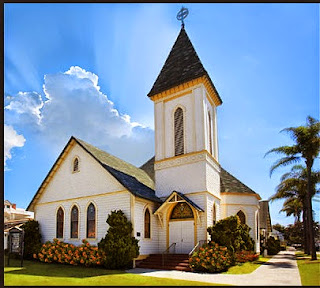Friday, April 4, 2014
So Who Are Southern Baptists?
So Who Are Southern Baptists?
by Derek Gentle
A seminary professor remarked that if any of us ended up serving a church in some parts of the north it might well be that only two ministers at the local pastors conference would believe in the virgin birth of Christ, the historicity of biblical miracles, and the full reliability of the Scriptures; it would be the Catholic priest and the Southern Baptist pastor. This serves to illustrate the fact that Southern Baptists actually do not have a doctrine to which they exclusively hold. Every belief embraced by Baptists is embraced by some other Christian group.
If one were to visit any given Southern Baptist church this Sunday he might be reminded of the worship style from any number of denominations. Worship style in Southern Baptist churches varies considerably and spans the spectrum from liturgical to emotional, formal to informal, traditional to contemporary. While this kind of variety can be found in most denominations, it is, among Southern Baptists, most pronounced.
So what distinguishes a Southern Baptist church from other denominations?
It is not simply a matter of belonging to the organization or being under its authority. In Baptist life each and every church is autonomous. No bishop nor hierarchical body can tell any local church how to conduct its business. There is no manual of discipline. Local churches themselves select their pastors and staff. They own their own building; the denomination cannot take it away - and should a Baptist church close its doors, they dispose of their property as they see fit. Nor can the denomination set an amount to collect from local churches. Southern Baptists give and work together in "voluntary cooperation."
Baptism by immersion is not unique to Southern Baptists, but it is certainly one defining distinctive. Baptists consider Christian baptism to be an ordinance for believers only, properly administered by immersion only, and as a symbolic act, not having any power in itself. The act of baptism pictures what Christ has done for us in His death, burial, and resurrection. It pictures what Christ has done in us through the new birth, enabling our death to the old life and resurrecting us to walk in newness of life. Baptism gives testimony to a salvation already received; it is not a requisite for salvation. It is an act of obedience to Jesus Christ.
The doctrine of a believers church is a key belief in Baptist life. Members come into the church personally, individually, and freely. No one is "born into the church." Only those who have personal faith in Christ comprise the true church in the eyes of God - and only those should be counted as members of the church. Admittedly, some falsely profess Christ, but as far as possible the church should ask the questions to ensure a regenerate church membership. This leads directly to the concept of congregational government and is related to the doctrine of "the priesthood of all believers." Only Christians should be making the decisions in the church and all those who are Christians have a responsibility to minister. It is also related to the Baptist ideal of a free church in a free state.
Baptists are evangelicals. That is, they adhere to the belief that while humanity is fallen, the good news is that Christ came to pay the penalty of our sins on the cross. That penalty, now paid in full, means that God offers forgiveness and new life as a free gift. All who will receive Christ as Lord may have it.
Baptists confess, along with many others, that one becomes a Christian through the new birth. When one receives Jesus Christ as Lord, the Holy Spirit does an internal work within the person to redirect his life, making him to be born again - or to use another biblical term, "regeneration." This is not merely choosing to "turn over a new leaf," but is a matter of God beginning a life-long process of changing our desires and affections. It doesn't mean the believer won't stumble, but refers to an inward pull that will not allow him to quit the faith. This is sometimes called, "Once saved, always saved." The proper term, however, is the final perseverance of the saints. It means that real Christians stick with it. Baptists do not believe that true believers will fall away and, thereby, lose their salvation.
The Good News is so vital that telling it is like sharing a cure for cancer. One could not keep it to himself. Hence, evangelism and missions have their supreme place in Baptist life. The International Mission Board of the SBC is the largest missionary sending agency in the world. Baptists do not believe themselves to be "the only ones going to heaven," but they affirm that all by any name who will come to God through Christ belongs to Him. In fact, they often work together with other "Great Commission Christians" in evangelistic and mission causes.
Southern Baptists, among other Baptist groups, emphasize churches cooperating in missions. The Cooperative Program is the vehicle for various Southern Baptist causes in one combined way. They also have two special missions offerings each year. The Lottie Moon Christmas Offering is named after a missionary to China and supports international missions. The Annie Armstrong Offering supports mission efforts in North America. This is a methodological distinction and is a part of the denominational sub-culture.
Southern Baptists are not all in the south anymore. They are everywhere. And they do not always have southern accents. In fact, a recurring topic is whether to change the name and take the word Southern out, but the right name just hasn't seemed to come along yet.
Subscribe to:
Post Comments (Atom)


No comments:
Post a Comment